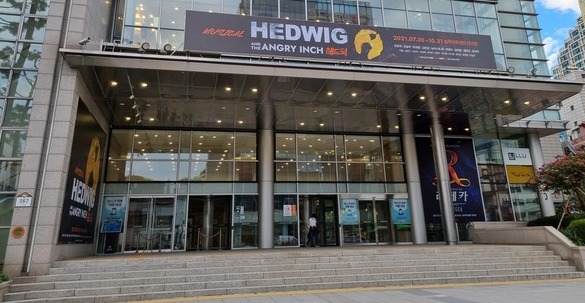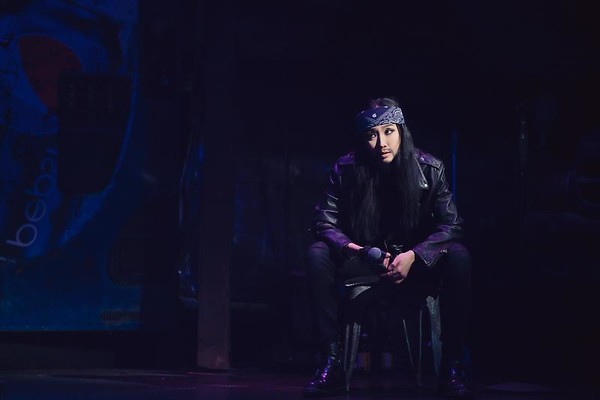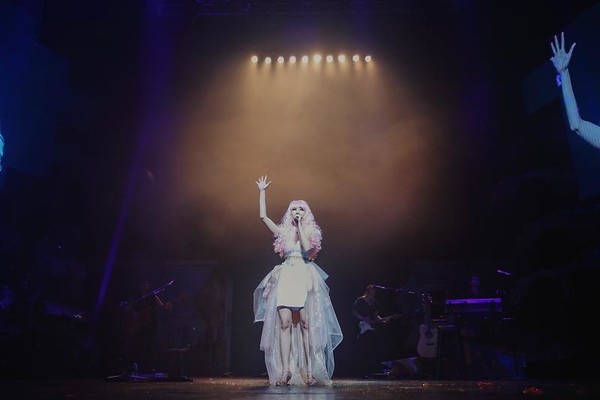The journey to find our “other half”

ELECTRIC GUITARS blaring, profanities spewing, wigs swishing: is this a drag show or a rock concert? No, it is Hedwig and the Angry Inch, a musical that has once again captured the attention of Korean audiences with its fusion of rock music, queer themes, and new cast, despite being its 16th year running. While the musical is “over-the-top” in the nature of its performance, it is much more multifaceted than a dramatic portrayal of a naïve main character with a “botched” transition surgery. Hedwig, played by Ren, welcomes us to her “show,” taking place backstage at her ex-boyfriend Tommy’s nationwide concert. In this marginal space, she recounts her journey from “he” to “she,” her pursuit of freedom, and the pains of abandonment and self-love. The plot is ripe with satirical elements, a statement against the “American Dream,” as well as critical of rose-colored dreams of finding our “other half.”

Hansel, Hedwig, and the other half
The plot of the musical is often pushed along by Hedwig’s desire to meet her “other half.” The idea of a predestined soulmate is instilled into Hansel, Hedwig’s pre-surgery younger self when his mother tells him about “The Origin of Love”—a song that originates from Aristophane’s speech in Plato’s Symposium. While many of us have more romantic preconceptions of our “other half” being a lover, Hansel takes the idea a little too literally. He questions, “Does my other half have what I don’t? […] Were we really separated forcibly or did he just run off with the good stuff.” In the musical, “The Origin of Love” is performed with an animated backdrop full of humans being duplicated and split into half; a visual representation that adds to Hansel’s perception that his other half has been physically stripped from him.
Hansel’s convoluted understanding of his other half seems to come from his own confusion about his sexual identity. As a gay boy living in east Berlin, Hansel’s identity is constantly invalidated and manipulated. While Hansel found music as a source of expression, his mother deprived him of that single comfort by throwing tomatoes at him whenever he sang. The lack of maternal acceptance led Hansel to seek validation and freedom through his supposed “other half”—Sergeant Luther Robinson.

American candy
Hansel leaves communist east Germany due to the seemingly sweet temptations of the “American Dream,” following his new “Sugar Daddy.” He is first drawn to the luxury of American candy offered by Sergeant Luther Robinson who later promises a better life and has Hansel take his mother’s passport and name, Hedwig. All that Hansel must give in return is his gender identity. Hansel’s desperation to leave Germany shines through as he attempts to convince Luther, “Well, you buy me the dress, I'll be more woman than a man like you can stand.” However, the transition surgery fails, and Hedwig is left with a botched one-inch piece of flesh dangling between her legs—the “Angry Inch.” The failed surgery implies how Hedwig’s life in America will not be easy. As Hedwig leaves to go live in Kansas with Luther, she is abandoned for another man on their first anniversary. Here, she gets her first taste of false promises of American candy.
Hedwig’s second heartbreak comes from her encounter with Tommy Gnosis, whom she once babysat and shared her passion for music. Hedwig believes Tommy is her “other half,” her American Dream, but he, a devout Christian, too abandons her when he finds out about her biological identity. Hedwig’s “American dream” does not work out easily and suggests that her other half, after all, may not exist in this land of “freedom.”
Just as Luther lured Hedwig into sacrificing her own identity for the illusion of American freedom, Hedwig offers a “helping hand” to Yitzhak—a Jewish drag queen who had to escape Croatia. Hedwig whispers, “To be free, one must give up a little part of oneself.” To escape, Yitzhak must renounce her passion for drag and marry Hedwig as a heteronormative male, never to wear a wig ever again. In an interview with The Yonsei Annals, Kim Ryeo-won, who played Yitzhak, claimed that “Though Yitzhak was able to live a second life thanks to Hedwig, I wanted to portray him as someone who couldn’t become a drag queen due to Hedwig’s oppression and only received half of her love.” Hedwig places her anger for not achieving the American Dream onto Yitzhak by using him as more of a slave, rather than a partner.
Playing Yitzhak
The imbalanced power dynamic between Hedwig and Yitzhak was clearly seen through Kim’s acting. Though Yitzhak was not a character of many words, Kim’s body language conveyed the extent of Yitzhak’s oppression—when Hedwig asked for a tissue, Yitzhak passes her a mop instead, making her irritated. When Yitzhak finally gives Hedwig an actual tissue, Hedwig thrusts the mop towards Yitzhak, making him flinch. Kim expressed her worry that the lack of lines would “make it harder to convince the audience of the character [she] wished to express.” However, despite her concerns, through passive-aggressive expressions and in her timid demeanor towards Hedwig, the toxic relationship was effectively portrayed.
Kim also voiced how holding a hand mic was an obstacle she had to overcome when expressing her character’s emotions. However, her ability as an actor to project subtle emotions without voicing many lines is impressive, especially in the scene where Yitzhak stands as a drag queen once again. As if she is shaking off the masculinity Hedwig once masked her in, Yitzhak’s body begins to tremble as she raises her chin up and her face lights up with raw emotion. Though some audience members may be confused as to how Yitzhak was so easily able to move past the trauma she incurred from Hedwig, Kim believes that “certainly, Yitzhak would have forgiven Hedwig,” as she pictures that “the two may continue to be supportive partners or may have gone forward with their own lives.”

Crushing the tomatoes
Tomatoes, symbolic of societal pressure and discrimination against Hedwig, become a source of catharsis by the musical’s end. Hedwig’s childhood trauma from her mother’s tomato barrage leads her to hate its scent. Despite this aversion to the fruit, Hedwig continues to use tomatoes to give her womanly curves. As Tommy’s concert draws to a close, he credits Hedwig for his musical success in his final song “Wicked Little Town” as he sings, “Now I understand how much I took from you […] you show this wicked town something beautiful and new.” When Hedwig hears Tommy thanking her from the crevice of the backstage, she finally feels accepted for who she is. Hedwig then rips off her gown and wig and takes out the tomatoes that were used to give her the shape of her breasts, destroying the fruit with an angered cry. In doing so, she has finally purged all the fake femininity that had been unknowingly ingrained within her. This purging act marks the climax of the musical where Hedwig returns to her authentic self: Hansel. Hedwig accepts her identity, finally allowing herself to stop hiding behind the appearance and gender identity of a “woman.” Following this realization, she understands that there is no “other half” but only oneself.

Period: 2021. 07. 30 (Fri.)-2021. 10. 31 (Sun.)
Hours: Tue., Thur., Fri. 19:00
Wed., Sat., Sun., public holidays 14:00, 19:00
No performances on Mondays
Ticket fee: Ranges between ₩55,000-₩110,000
Location: Seoul, Chungmu Art Center

